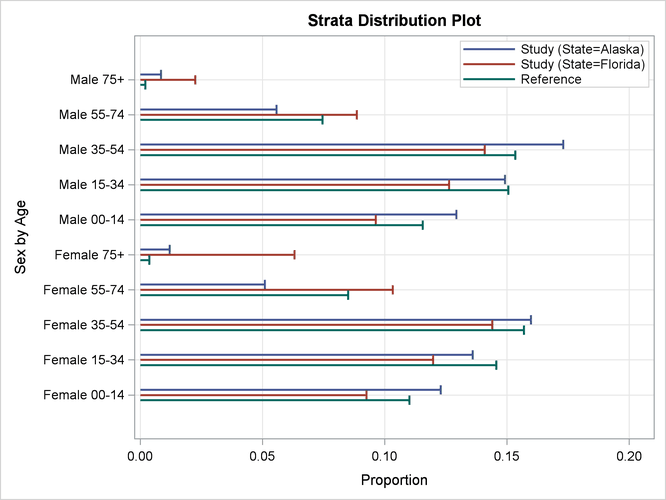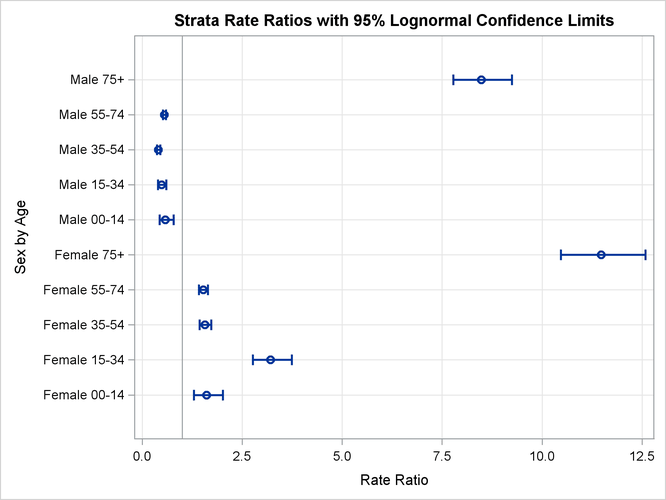The STDRATE Procedure
- Overview
- Getting Started
-
Syntax

-
Details
 RateRiskDirect StandardizationMantel-Haenszel Effect EstimationIndirect Standardization and Standardized Morbidity/Mortality RatioAttributable Fraction and Population Attributable FractionApplicable Data Sets and Required Variables for Method SpecificationsApplicable Confidence Limits for Rate and Risk StatisticsTable OutputODS Table NamesGraphics OutputODS Graphics
RateRiskDirect StandardizationMantel-Haenszel Effect EstimationIndirect Standardization and Standardized Morbidity/Mortality RatioAttributable Fraction and Population Attributable FractionApplicable Data Sets and Required Variables for Method SpecificationsApplicable Confidence Limits for Rate and Risk StatisticsTable OutputODS Table NamesGraphics OutputODS Graphics -
Examples

- References
Example 88.1 Comparing Directly Standardized Rates
This example computes directly standardized mortality rates for populations in the states of Alaska and Florida, and then compares these two standardized rates with a rate ratio statistic.
The Alaska data set contains the stratum-specific mortality information in a given period of time for the state of Alaska (Alaska Bureau
of Vital Statistics, 2000a, 2000b). Variables Sex and Age are the grouping variables that form the strata in the standardization, and variables Death and PYear indicate the number of events and person-years, respectively. The COMMA9. format is specified in the DATA step to input numerical
values that contain commas in PYear.
data Alaska; State='Alaska'; input Sex $ Age $ Death PYear comma9.; datalines; Male 00-14 37 81,205 Male 15-34 68 93,662 Male 35-54 206 108,615 Male 55-74 369 35,139 Male 75+ 556 5,491 Female 00-14 78 77,203 Female 15-34 181 85,412 Female 35-54 395 100,386 Female 55-74 555 32,118 Female 75+ 479 7,701 ;
The Florida data set contains the corresponding stratum-specific mortality information for the state of Florida (Florida Department of
Health, 2000, 2012). Variables Sex and Age are the grouping variables that form the strata in the standardization, and variables Death and PYear indicate the number of events and person-years, respectively.
data Florida; State='Florida'; input Sex $ Age $ Death comma8. PYear comma11.; datalines; Male 00-14 1,189 1,505,889 Male 15-34 2,962 1,972,157 Male 35-54 10,279 2,197,912 Male 55-74 26,354 1,383,533 Male 75+ 42,443 554,632 Female 00-14 906 1,445,831 Female 15-34 1,234 1,870,430 Female 35-54 5,630 2,246,737 Female 55-74 18,309 1,612,270 Female 75+ 53,489 868,838 ;
The TwoStates data set contains the data sets Alaska and Florida:
data TwoStates; length State $ 7.; set Alaska Florida; run;
The US data set contains the corresponding stratum-specific person-years information for the United States (U.S. Bureau of Census,
2011). Variables Sex and Age are the grouping variables that form the strata in the standardization, and the variable PYear indicates the person-years.
data US; input Sex $ Age $ PYear comma12.; datalines; Male 00-14 30,854,207 Male 15-34 40,199,647 Male 35-54 40,945,028 Male 55-74 19,948,630 Male 75+ 6,106,351 Female 00-14 29,399,168 Female 15-34 38,876,268 Female 35-54 41,881,451 Female 55-74 22,717,040 Female 75+ 10,494,416 ;
The following statements invoke the STDRATE procedure and compute the direct standardized rates for the states of Florida and Alaska by using the United States as the reference population. The DATA= option names the data set for the study populations, and the REFDATA= option names the data set for the reference population.
ods graphics on;
proc stdrate data=TwoStates
refdata=US
method=direct
stat=rate(mult=1000)
effect
plots(only)=(dist effect)
;
population group=State event=Death total=PYear;
reference total=PYear;
strata Sex Age / effect;
run;
ods graphics off;
The METHOD=DIRECT option requests direct standardization, and the STAT=RATE option specifies the rate statistic for standardization. With the EFFECT option, the procedure computes the rate effect between the study populations with the default rate ratio statistics.
The “Standardization Information” table in Output 88.1.1 displays the standardization information.
Output 88.1.1: Standardization Information
| Standardization Information | |
|---|---|
| Data Set | WORK.TWOSTATES |
| Group Variable | State |
| Reference Data Set | WORK.US |
| Method | Direct Standardization |
| Statistic | Rate |
| Number of Strata | 10 |
| Rate Multiplier | 1000 |
With ODS Graphics enabled, the PLOTS(ONLY)=(DIST EFFECT) option displays the strata distribution plot and the strata effect plot, but does not display the default strata rate plot.
The strata distribution plot displays proportions for stratum-specific person-years in the study populations and reference population, as shown in Output 88.1.2.
Output 88.1.2: Strata Distribution Plot

The EFFECT option in the STRATA statement and the STAT=RATE option request that the “Strata Rate Effect Estimates” table in Output 88.1.3 display the stratum-specific rate effect statistics between the two study populations. The default EFFECT=RATIO in the PROC STDRATE statement requests that the stratum-specific rate ratio statistics be displayed.
Output 88.1.3: Strata Effect Estimates
| Strata Rate Effect Estimates (Rate Multiplier = 1000) | |||||||
|---|---|---|---|---|---|---|---|
| Stratum Index |
Sex | Age | State | Rate Ratio |
|||
| Alaska | Florida | 95% Lognormal Confidence Limits |
|||||
| 1 | Female | 00-14 | 1.010 | 0.6266 | 1.6123 | 1.2794 | 2.0319 |
| 2 | Female | 15-34 | 2.119 | 0.6597 | 3.2121 | 2.7481 | 3.7544 |
| 3 | Female | 35-54 | 3.935 | 2.5059 | 1.5702 | 1.4180 | 1.7389 |
| 4 | Female | 55-74 | 17.280 | 11.3560 | 1.5217 | 1.3984 | 1.6557 |
| 5 | Female | 75+ | 62.200 | 5.4191 | 11.4779 | 10.4536 | 12.6026 |
| 6 | Male | 00-14 | 0.456 | 0.7896 | 0.5771 | 0.4160 | 0.8004 |
| 7 | Male | 15-34 | 0.726 | 1.5019 | 0.4834 | 0.3801 | 0.6148 |
| 8 | Male | 35-54 | 1.897 | 4.6767 | 0.4055 | 0.3533 | 0.4655 |
| 9 | Male | 55-74 | 10.501 | 19.0483 | 0.5513 | 0.4975 | 0.6109 |
| 10 | Male | 75+ | 101.257 | 11.9394 | 8.4809 | 7.7634 | 9.2647 |
The “Strata Rate Effect Estimates” table shows that except for the age group 75+, Alaska has lower mortality rates for male groups and higher mortality rates for female groups than Florida. For age group 75+, Alaska has much higher mortality rates than Florida for both male and female groups.
With ODS Graphics enabled and two study populations, the PLOTS=EFFECT option displays the stratum-specific effect measures
and their associated confidence limits, as shown in Output 88.1.4. The STAT=RATE option and the default EFFECT=RATIO option request that the strata rate ratios be displayed. By default, confidence
limits are generated with ![]() confidence level. This plot displays the stratum-specific rate ratios in the “Strata Rate Effect Estimates” table in Output 88.1.3.
confidence level. This plot displays the stratum-specific rate ratios in the “Strata Rate Effect Estimates” table in Output 88.1.3.
Output 88.1.4: Strata Effect Measure Plot

The “Directly Standardized Rate Estimates” table in Output 88.1.5 displays directly standardized rates and related statistics.
Output 88.1.5: Directly Standardized Rate Estimates
| Directly Standardized Rate Estimates Rate Multiplier = 1000 |
|||||||||
|---|---|---|---|---|---|---|---|---|---|
| State | Study Population | Reference Population | Standardized Rate | ||||||
| Observed Events |
Population- Time |
Crude Rate |
Expected Events |
Population- Time |
Estimate | Standard Error |
95% Normal Confidence Limits |
||
| Alaska | 2924 | 626932 | 4.6640 | 1126924 | 266481515 | 4.2289 | 0.0901 | 4.0522 | 4.4056 |
| Florida | 76455 | 15577105 | 4.9082 | 1076187 | 266481515 | 4.0385 | 0.0156 | 4.0079 | 4.0691 |
The MULT=1000 suboption in the STAT=RATE option requests that rates per ![]() person-years be displayed. The table shows that the although the crude rate in the
person-years be displayed. The table shows that the although the crude rate in the Florida population (4.908) is higher than the crude rate in the Alaska population (4.664), the resulting standardized rate in the Florida population (4.0385) is lower than the crude rate in the Alaska population (4.2289).
The EFFECT option requests that the “Rate Effect Estimates” table in Output 88.1.6 display the log rate ratio statistics of the two directly standardized rates by default.
Output 88.1.6: Effect Estimates
| Rate Effect Estimates (Rate Multiplier = 1000) | ||||||
|---|---|---|---|---|---|---|
| State | Rate Ratio |
Log Rate Ratio |
Standard Error |
Z | Pr > |Z| | |
| Alaska | Florida | |||||
| 4.2289 | 4.0385 | 1.0471 | 0.0461 | 0.0217 | 2.13 | 0.0335 |
The table shows that with a log rate ratio statistic 1.047, the resulting p-value is 0.0335, which indicates that the death rate is significantly higher in Alaska than in Florida at the ![]() significance level.
significance level.